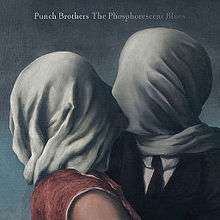Wired
Wired may refer to:
Art, entertainment, and media
Fictional entities
Film
Music
Albums
Songs
Publications and internet
- Wired (website) (formerly Wired News or HotWired), a formerly separately-run website which publishes technology blogs and includes parts of the magazine
- Wired UK, a UK offshoot monthly science and technology magazine owned by Condé Nast

Wired (magazine)
Wired is a full-color monthly American magazine, published in both print and online editions, that reports on how emerging technologies affect culture, the economy and politics. Owned by Condé Nast, it is headquartered in San Francisco, California and has been in publication since its first issue in March/April 1993. Several spin-offs have been launched including: Wired UK, Wired Italia, Wired Japan and Wired Germany.
In its earliest colophons, Wired credited Canadian media theorist Marshall McLuhan as its "patron saint." From the beginning, the strongest immediate influence on the magazine's editorial outlook came from the techno-utopian agenda of co-founder Stewart Brand and his long-time associate Kevin Kelly.
From 1998 to 2006, Wired magazine and Wired News (which publishes at Wired.com) had separate owners. However, throughout that time, Wired News remained responsible for reprinting Wired magazine's content online, due to a business agreement made when Condé Nast purchased the magazine (but not the website). In July 2006, Condé Nast announced an agreement to buy Wired News for $25 million, reuniting the magazine with its website.

Wired (book)
Wired: The Short Life and Fast Times of John Belushi, is a 1984 non-fiction book by American journalist Bob Woodward about the American actor and comedian John Belushi. The hardcover edition includes sixteen pages of black-and-white photos, front and back.
Details
Many friends and relatives of Belushi, including his widow Judith Belushi Pisano, Dan Aykroyd and James Belushi, agreed to be interviewed at length for the book, but later felt the final product was exploitative and not representative of the John Belushi they knew. Pisano wrote her own book, Samurai Widow (1990) to counter the image of Belushi portrayed in Wired. In 2013 Tanner Colby, who had co-authored the 2005 book Belushi: A Biography with Pisano, wrote about how Wired exposes Woodward's strengths and weaknesses as a journalist. While in the process of researching the anecdotes related in the book, he found that while many of them were true, Woodward missed, or didn't seek out, their meaning or context.
For example, in Woodward's telling, a "lazy and undisciplined" Belushi is guided through the scene on the cafeteria line in Animal House by director John Landis, yet other actors present for that scene recall how much of it was improvised by the actor in one single take. Blair Brown told Colby she was still angry about how Woodward "tricked" her in describing her and Belushi preparing for a love scene in Continental Divide. Colby notes that Woodward devotes a single paragraph to Belushi's grandmother's funeral, where he hit a low point and resolved to get clean for that film, while diligently documenting every instance of drug abuse he turned up. "It's like someone wrote a biography of Michael Jordan in which all the stats and scores are correct, but you come away with the impression that Michael Jordan wasn't very good at playing basketball," he concluded.
Julep
Julep and similar may mean:

The Phosphorescent Blues
The Phosphorescent Blues is the fourth studio album by the American group Punch Brothers, released on January 27, 2015. The band announced the release of the album's first single, "I Blew It Off", on November 17, 2014, On December 4, 2014, the group announced the album's name and release date, along with the second single, "Julep".
Track listing
References
Julep (company)
Julep Beauty, Inc. is a privately held Seattle, WA based cosmetics company founded in 2007 by Jane Park, a former Starbucks and Boston Consulting Group executive. The company sells its products online, which includes the company’s Julep Maven service, in retail and in its branded beauty parlors.
History
Starting in 2007, Julep opened four nail parlors in the Seattle area that offer manicures, pedicures, facials, and waxing. CEO Jane Park saw a rise in popularity for nail care products, prompting her to focus on selling new products online and through television. While expanding the parlors as a "third place" for women was the initial business model, Park now says she uses the parlors as a testing ground for new products.
Julep moved into e-commerce in 2008. The company’s website is now its main sales channel, making available more than 300 new products on its website in 2013. Julep products are also available through their Seattle parlors, through retailers such as Sephora, Nordstrom and on TV though QVC. Also in 2013, it opened its first pop-up store in New York City. Julep reportedly tripled its revenue in 2013.
Podcasts:

